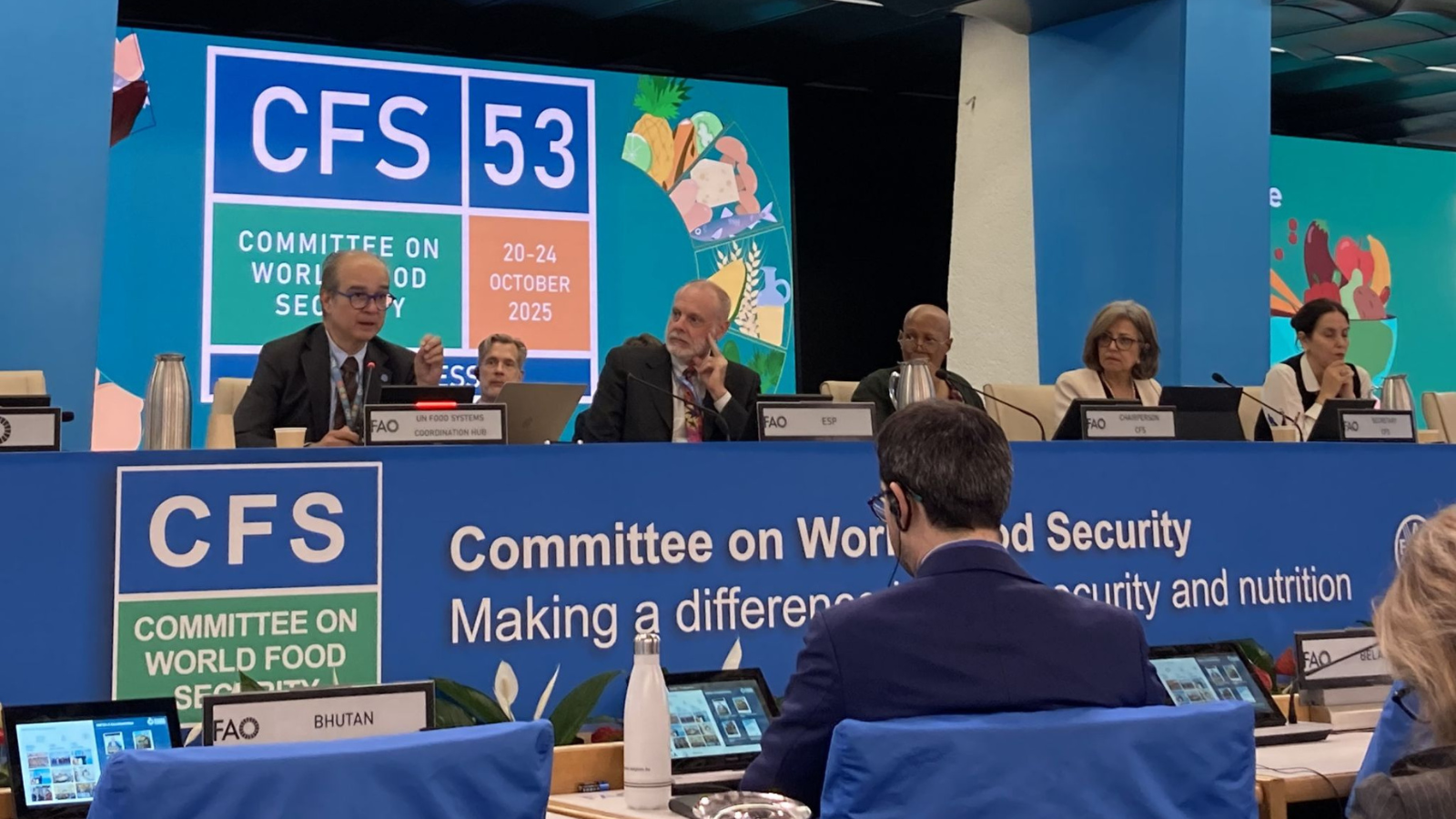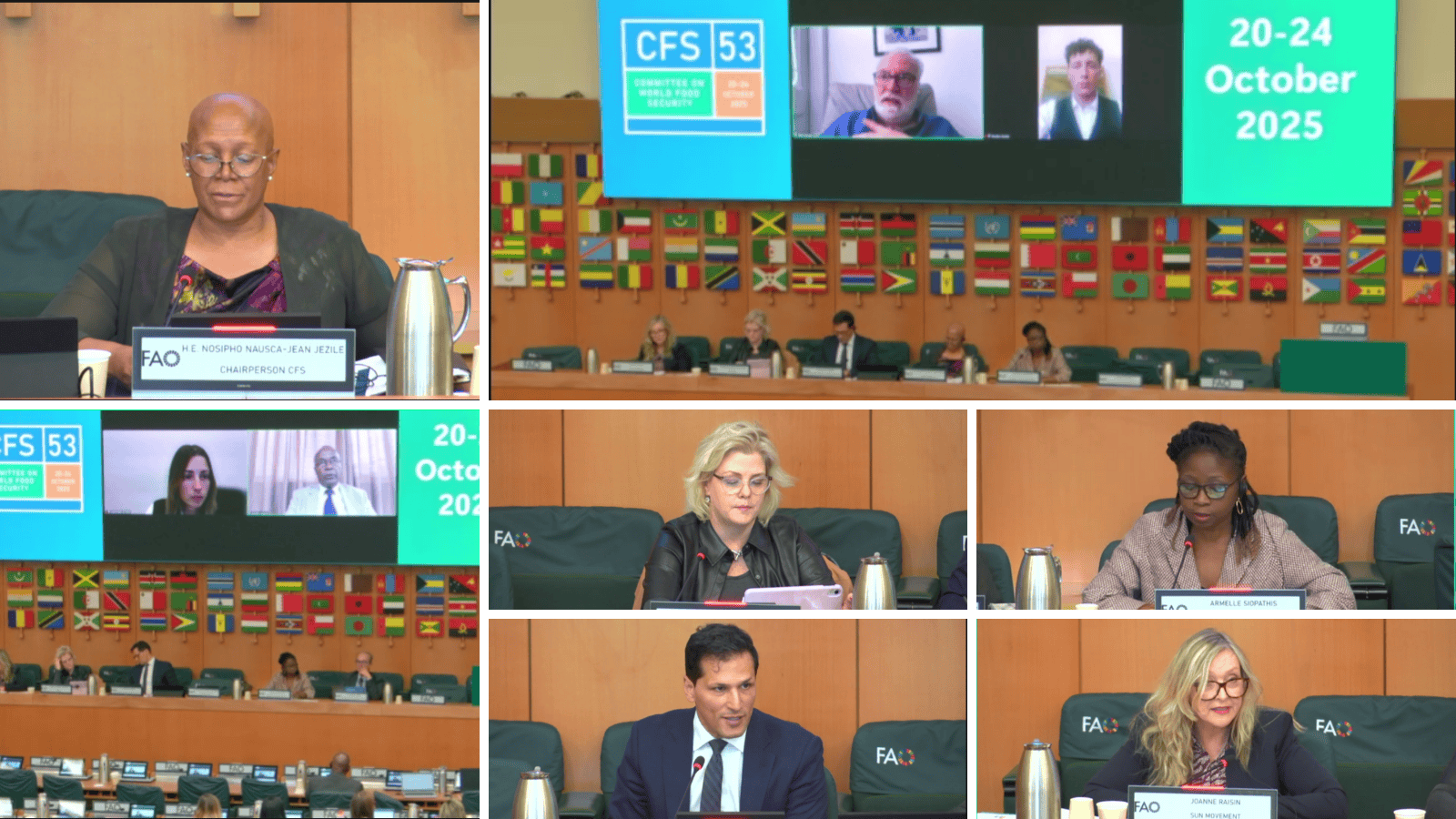The Hub strengthens collaboration with CFS to deliver on the UNFSS+4 Call to Action

Rome, 24 October 2025 — At this year’s 53rd session of the Committee on World Food Security (CFS), delegates gathered at FAO Headquarters in Rome to discuss how global policies can better respond to the growing pressures of hunger, inequality, and climate change. For the UN Food Systems Coordination Hub, it was an opportunity to reinforce one message: Food systems transformation progress depends on turning global commitments into tangible results on the ground.
Strengthening the bridge between global and national action
At the CFS53 Plenary Session on “Strengthening the Impact of CFS Policy Products,” the Hub emphasized the importance of connecting global guidance with country-level implementation. Addressing the 139 Member States of the Committee, Dr. Fotiou underscored that CFS policy products – ranging from voluntary guidelines on food systems and nutrition to principles for responsible agricultural investment and the framework for action in protracted crises – offer concrete tools that can guide national action. These, he said, are not theoretical frameworks but practical resources that help governments develop coherent, rights-based policies for more sustainable and equitable food systems.
The Hub’s country support reflects this approach. Working with 159 National Convenors, it helps governments coordinate across ministries, mobilize financing, and align food systems action with climate and development priorities. Initiatives such as the Convergence Initiative, the Scalable Success Model and the Joint SDG Fund are helping countries bridge the gap between planning and implementation.
From Addis Ababa to Rome
The Hub’s side event, “From Ambition to Action: Building on the UNFSS+4 Outcomes for Food Systems Transformation,” brought together governments, UN agencies, and youth representatives to explore how countries are advancing the UN Secretary-General’s Call to Action, launched at the UN Food Systems Summit +4 in Addis Ababa in July.
Co-organized with the Governments of Ethiopia, Italy, and Brazil, FAO, the Scaling Up Nutrition (SUN) Movement, and the Major Group for Children and Youth, the discussion focused on moving from plans to implementation. The event was moderated by Khaled Eltaweel, Senior Programme Coordinator of the Hub.
Opening the discussion, Alessandra di Pippo from the Italian Ministry of Foreign Affairs and Mandefro Nigussie, CEO of Ethiopia’s Agricultural Transformation Institute, representing the co-hosts of UNFSS+4 opened the event by reaffirming their countries’ commitments to advancing food systems transformation through partnerships and shared priorities.
Reflecting on the key outcomes of UNFSS+4, Stefanos Fotiou, Director of the UN Food Systems Coordination Hub, described the Call to Action as “a mandate for delivery, not just momentum,” and urged partners to strengthen accountability, unlock innovative financing, and help countries embed food systems transformation into national development plans. He noted that more than 130 nations have already established food systems pathways, many now being integrated into climate strategies, social policies, and investment frameworks.
Lessons from the field
Speakers shared examples of progress and persistence from across regions. Armelle Siopathis, National Food Systems Convenor of the Central African Republic, described how the country is working to launch a new coordination platform, supported by UN partners, and revitalize data systems to improve monitoring.
Rami Zurayk, speaking for Lebanon’s National Convenor, highlighted agroecology and the forthcoming national Right to Food law as means to strengthen resilience amid overlapping crises. From Brazil, Janine Giuberti Coutinho of the Ministry of Social Development highlighted how coordinated public policies, active social participation, and political will have driven notable progress in food security – efforts that have lifted Brazil off the hunger map.
Representing the SUN Movement, Joanne Raisin pointed to growing momentum among governments to integrate nutrition into food and climate policies, in line with the UNFSS+4 Call to Action. She stressed the need for practical collaboration and more flexible financing to help countries bridge policy and implementation gaps. Nicolás Domke Venegas, from the Major Group for Children and Youth, called for young people to be recognized not merely as participants but as co-creators of solutions shaping the future of food systems.
Closing the discussion, Ambassador Nosipho Nausca-Jean Jezile, Chair of the CFS, emphasized the importance of complementarity among global initiatives and innovation within multilateral processes to build equitable, sustainable, and resilient food systems.

Deepening collaboration with the CFS
The collaboration between the Hub and the CFS continues to deepen. Building on existing synergies, the two entities have partnered in implementing webinars and side events aimed at promoting the uptake of CFS policy tools among National Convenors and UN Country Teams. The CFS Chair, who also serves on the UN Food Systems Summit Advisory Group, has been instrumental in connecting both platforms to ensure that global policy guidance translates into national action.
Both institutions share a common goal: inclusive transformations towards more sustainable food systems to realize the right to food for all. Together, they are helping governments translate broad international commitments into targeted policies that improve food security, strengthen nutrition, and build climate resilience.
Next steps for collaboration
As CFS53 concluded, participants reflected on how the lessons from Addis Ababa are shaping a new phase of implementation. Food systems transformation, Dr. Fotiou said, is no longer an aspiration but an active process unfolding across countries. The challenge now is to sustain that momentum and scale what works – ensuring that policies lead to measurable improvements in people’s lives.
“Transformation happens when ambition meets accountability,” he said. “That’s what our collaboration with the CFS is about: helping countries move from dialogue to delivery.”
